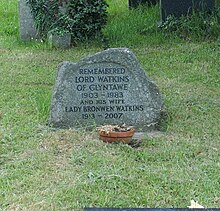Tudor Watkins, Baron Watkins
Tudor Elwyn Watkins, Baron Watkins (born May 9, 1903 in Abercrave , Powys , Wales , † November 2, 1983 in Brecknockshire ) was a British Labor Party politician who was a member of the House of Commons for 25 years and who was appointed in 1972 due to the Life Peerages Act 1958 when Life Peer became a member of the House of Lords .
Life
Watkins, whose father was a Baptist deacon , began his professional career as a miner at the age of fourteen after attending school in 1917 and worked in a colliery in Wales until 1925 . Then he worked as a full-time secretary in the constituency office of the Labor Party from 1925 to 1933 Breconshire and Radnorshire worked before he 1937-1948 Secretary General of the Association of Workers' Associations ( Association of Friendly Societies ) in Brecknockshire was. In the meantime, he attended evening classes organized by the Workers' Educational Association and the National Council of Labor Colleges, as well as lectures at Coleg Harlech in Harlech .
Watkins began his political career in local politics when he was elected member ( Alderman ) of the County Council of Brecknockshire for the Labor Party in 1940 , and was a member until 1974.
After the end of the Second World War , Watkins was elected member of the House of Commons for the first time in the general election of July 5, 1945 as a candidate for the Labor Party in the constituency of Breconshire and Radnorshire and was part of the House of Commons for almost 25 years until the general election on June 18, 1970 long on. In his first election in 1945, he was able to prevail against the candidate of the Conservative Party and previous member of the House of Commons from the Camberwell North West constituency, Oscar Guest : while he received 19,725 votes (46.8 percent), Guest received only 14,089 votes (33.4 percent) ).
In the 1950s he was one of the supporters of the Parliament for Wales campaign , which campaigned for an independent parliament in Wales. He was also a supporter of the Campaign for Nuclear Disarmament (CND), which led the British peace movement , and paid a visit to the Soviet Union in 1961 .
After the election of the Labor Party in the general election of October 15, 1964 Davies was on 20 October 1964 by Prime Minister Harold Wilson to the Parliamentary Private Secretary ( Parliamentary Private Secretary ) of the Minister of Wales ( Secretary of State for Wales ) James Griffiths appointed and held this Function also under his successor Cledqyn Hughes until 1967. In addition, he was chairman of the lower house committee on agriculture between 1966 and 1968. After leaving the House of Commons, he served as Chairman of the Border Counties (Wales) Hospital Management Committee from 1970 until the reorganization of the Welsh hospital system in 1974 and also became a member of the Countryside Commission in 1970 , a body for the administration of the national parks in England and Wales.
By a letters patent dated May 10, 1972 Watkins was raised as a life peer with the title Baron Watkins , of Glyntawe in the County of Brecon, in the nobility and was thus a member of the House of Lords until his death. His official introduction ( Introduction ) as a member of the House of Lords was on June 7, 1972 with the support of Arthur Champion, Baron Champion and Thomas Jones, Baron Maelor .
After the reorganization of the counties of Wales, Baron Watkins was first chairman of the County Council of Powys between 1974 and 1977 and also chairman of the Brecon Beacons National Park Committee from 1974 to 1978 . In 1975 he also became Lord Lieutenant of Powys and held that office until 1978.
Web links
- Tudor Watkins at Hansard (English)
- Entry in Cracroft's Peerage
- Entry in Leigh Rayment Peerage
- Tudor Elwyn Watkins, Baron Watkins, on thepeerage.com , accessed September 13, 2016.
- Entry in the Welsh Biography Online
- Lord Watkins Papers (National Library of Wales)
- BBC Paintings
- Chris Cook (Editor): The Routledge Guide to British Political Archives: Sources since 1945 , 2012, ISBN 1-13650-9-615 , p. 203
Individual evidence
- ^ London Gazette (Supplement). No. 45634, HMSO, London, March 28, 1972, p. 3881 ( PDF , accessed October 16, 2013, English).
- ↑ Edinburgh Gazette . No. 19100, HMSO, Edinburgh, May 26, 1972, p. 463 ( PDF , accessed October 16, 2013, English).
- ↑ Entry in Hansard (June 7, 1972)
| personal data | |
|---|---|
| SURNAME | Watkins, Tudor, Baron Watkins |
| ALTERNATIVE NAMES | Watkins, Tudor Elwyn, Baron Watkins (full name) |
| BRIEF DESCRIPTION | British politician (Labor Party) |
| DATE OF BIRTH | May 9, 1903 |
| PLACE OF BIRTH | Abercrave , Powys , Wales |
| DATE OF DEATH | November 2nd 1983 |
| Place of death | Brecknockshire |
